Retailers share AI vehicle tracking data with police

Retailers share AI camera data with police
AI-powered cameras are tracking where you drive, even on private property. Emails show a coordinated effort to control what police tell you.
MILWAUKEE - CORRECTION: An earlier version of this story suggested Froedtert Hospital has Flock cameras in use. A spokesperson for Froedtert & The Medical College of Wisconsin clarified that "select locations" throughout their "health network" use Flock cameras, but not specifically Froedtert Hospital.
A fast-growing fleet of AI-powered cameras is keeping track of where you drive – even on private property.
But emails obtained by the FOX6 Investigators show a coordinated effort to control what police tell you about this new technology.
Just before Waukesha police chased down four teenage carjacking suspects last fall, they got a crucial tip from a state-of-the-art eyewitness.
SIGN UP TODAY: Get daily headlines, breaking news emails from FOX6 News
"All we had was a license plate and a vehicle description to go on," said Waukesha Police Lt. David Daily.
Minutes earlier, two of the young men tried to steal a car at gunpoint, then abandoned the plan when they realized the vehicle owner still had the key fob in his pocket. They ran to a nearby getaway car – a silver Nissan with damage to the driver's side door. That's when Daily said a new fleet of license-plate reading cameras paid off.
"Sure enough," he said, "the vehicle hit on one of the cameras."
The ensuing chase and crash led to four felony arrests and one conclusion.
"This is a really good investigative tool," Daily said.
All over southeastern Wisconsin, Flock Safety cameras are scanning traffic – looking for vehicles that are stolen or wanted in connected to crime.
"I was amazed at how many stolen cars, stolen plates and people were coming through our village," said Grafton Police Chief Jeff Caponera.
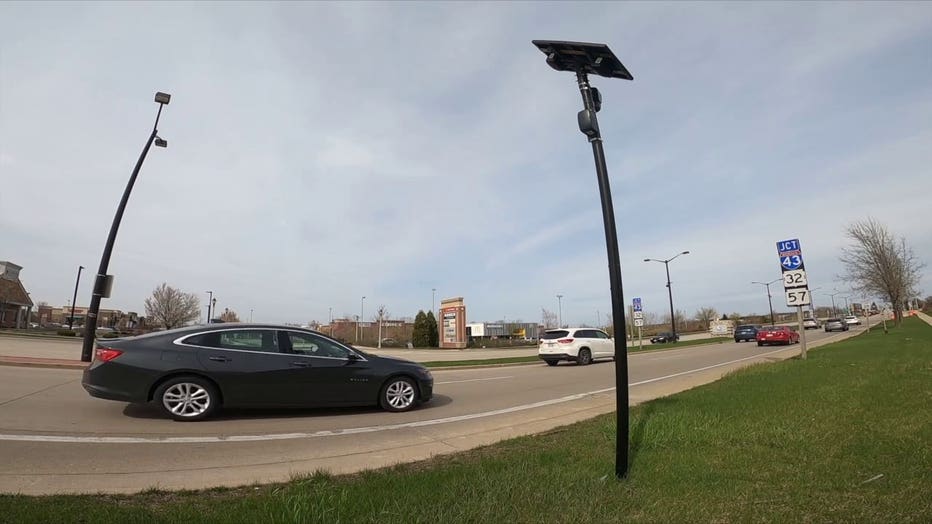
Flock cameras scan traffic near the I-43 ramps in Grafton
Grafton has 10 cameras, plus a few more purchased by a busy retail center that shares the data with police. Grafton Commons, anchored by Costco, has been the target of organized retail crime crews, often coming into the city in stolen vehicles. Thanks to the privately-owned Flock cameras in the shopping center, police now get an early heads up.
"Anytime those suspects come into our village and they hit on our camera," Caponera said, "our officers know about it."
And that means police can disrupt crime before it's been committed.
"How do you disrupt that?" asked FOX6 Investigator Bryan Polcyn.
"Just by driving through the parking lot," Caponera said.
"Being visible," Polcyn replied.
"Being visible, yeah."
In 2021, Caponera became one of the first police chiefs in the Badger state to install Flock cameras. He immediately started spreading the word to other chiefs.
"And it’s been successful," Caponera said.
By March 2022, West Allis had a contract for 21 cameras lining the perimeter of the city. Four months after that, West Allis Chief Patrick Mitchell invited a Flock sales representative to Minnesuing Acres, the secluded site of an annual police executive retreat near Lake Superior. For a $2,500 sponsorship, Mitchell promised the Flock salesman a level of access to that "can't be matched" to 25 police executives from agencies "with money to spend on technology."
"We're not different from other industries with having conferences and vendors being there," said West Allis Deputy Chief Robert Fletcher, who said Flock is a useful took for resource-strapped agencies.
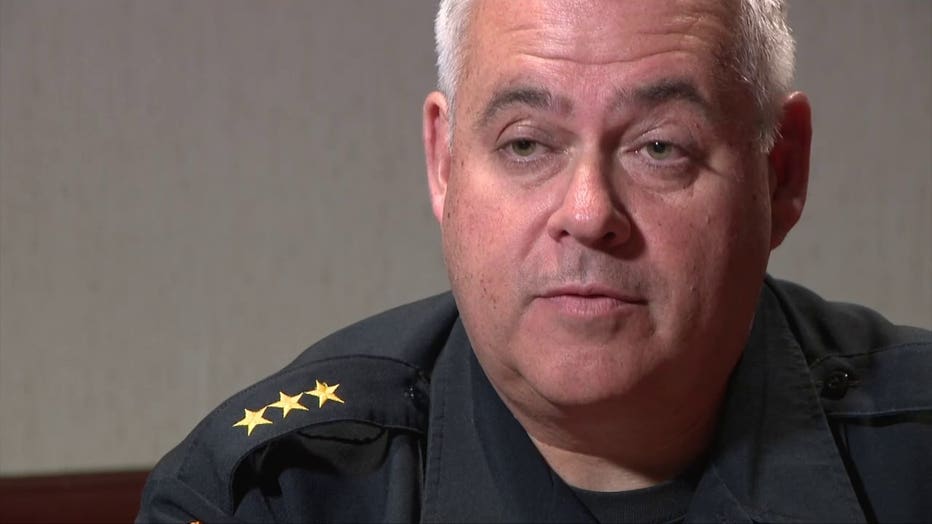
West Allis Police Deputy Chief Robert Fletcher
"It's a force multiplier for officers," he said, "because we obviously can’t have officers all over the city all the time."
FOX6 Investigators asked the 36 largest police departments in an eight-county area of southeastern Wisconsin if they are using Flock cameras. Of those 36, 27 departments said they already have the cameras in operation or have contracts to install them soon.
Others agencies may not have cameras, but do have signed agreements to access Flock's nationwide database of more than one billion license plate reads per month.
"So you've got a pretty wide net out there," said Polcyn.
"Yes," answered Daily.
But it's not just criminals getting caught in the net. It's everyone who drives.
"That’s a big deal," said Jay Stanley, privacy and technology policy analyst for the ACLU. "With Flock, you’re not only collecting data on where people are going and when, but all that data from at least many, many cameras around the country are going to this centralized company. And that allows for mass searches across the country."
To limit the potential for abuse, Flock's standard contract calls for data to be automatically deleted after 30 days.
"I'm of the mind that data is largely a liability, not an asset," said Flock Safety CEO Garrett Langely. And that's why Langley said police departments should be transparent about what they're using the technology for.
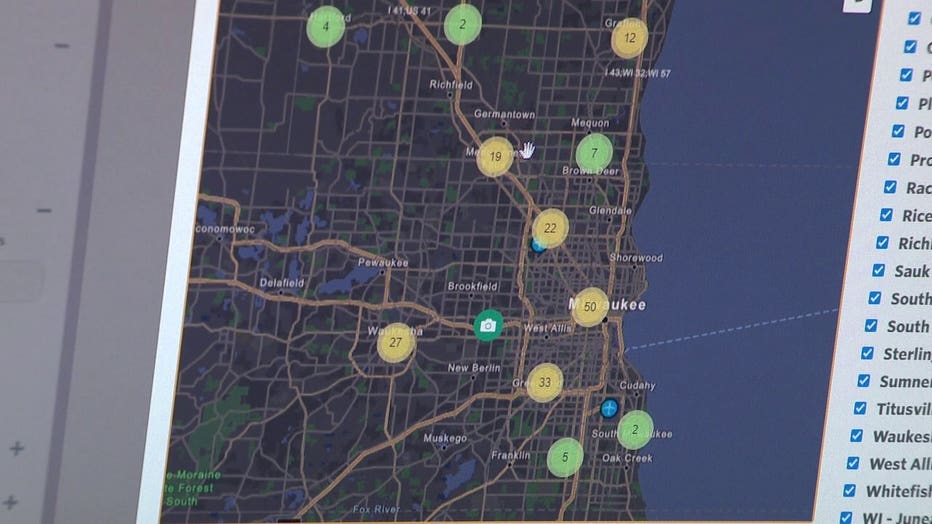
27 of the 36 largest police departments in the Milwaukee area have Flock cameras or have contracts to install them soon
"In California," he said, "every agency has to have a public hearing before buying our technology. That’s a state law."
In Wisconsin, there is no such requirement. What little public discussion does take place is usually brief. In May 2022, the city of Waukesha's Finance Committee had a 14-minute presentation and discussion about testing Flock cameras before approving them unanimously.
"Civil liberties are always a balancing act we have to have," said Ald. Frank McElderry, who represents the city's 12th District.
But while Flock's CEO touts the virtues of transparent debate, thousands of emails obtained by the FOX6 Investigators show most police departments spend months or even years planning for the installation of Flock cameras before they ever come up for a vote. Those emails also show Flock's sales reps carefully manage what they want police to tell you about the technology, in hopes of heading off any controversy.
They tell police they can help them "control the narrative" and "align the message" by "approaching friendly local media" with "common talking points."
"We want to make sure the facts are true," Langley said.
FREE DOWNLOAD: Get breaking news alerts in the FOX6 News app for iOS or Android.
In the fall of 2021, Flock wrote a press release for Germantown police – literally putting words in the mouth of Police Chief Mike Snow.
In an Oct. 4, 2021, email to Germantown Det. Sgt. Penny Schmitt, Flock Safety Communications Director Holly Beilin wrote: "I took the liberty of drafting a quote from Chief Snow." She added: "Once you have approved, we can begin approaching friendly media."
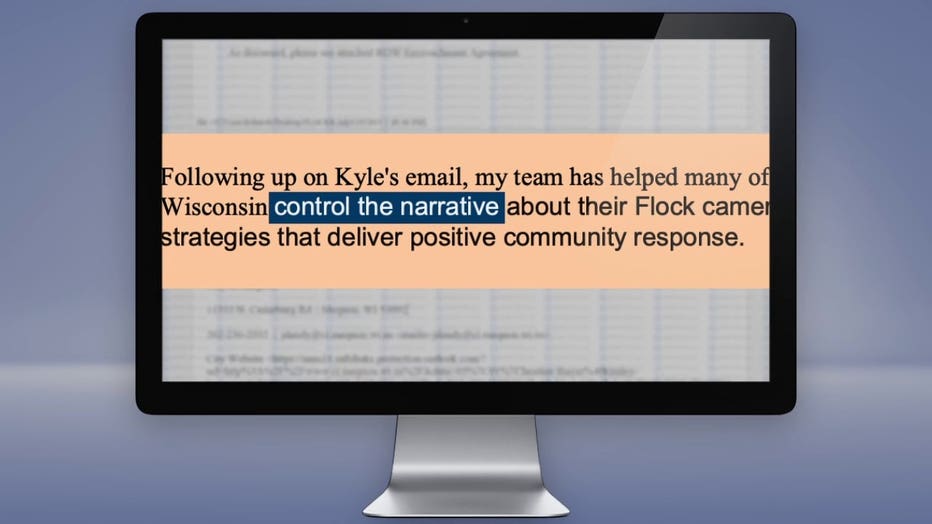
Emails between Flock and local police show the private company attempting to manage what police tell the public about the new technology
Now retired, then Capt. Todd Grenier approved the language before the department sent out the release with no indication it was crafted by a private, for-profit vendor with a financial stake in the department's use of the system. The press release included a bold claim that Flock cameras "reduce crime by over 70 percent."
Chief Snow told FOX6 he "did not personally make any efforts" to verify that claim.
"Should a public agency be allowing private vendors to write their press releases for them?" Polcyn asked.
"I don't see why not," Langley answered.
The glowing press release got the attention of local newsrooms – including FOX6 – which led to stories that Flock then used to sell more cameras.
"I don’t think our public servants should be teaming up with particular companies and acting as their sales agents," Stanley said.
But Wisconsin police departments aren't just talking up Flock cameras to each other. They're hooking Flock up with contacts for private businesses – from big box retailers like Menards, Home Depot, Fleet Farm, Target and Walmart, to grocery stores, apartment complexes, campgrounds, sports teams – even medical facilities.
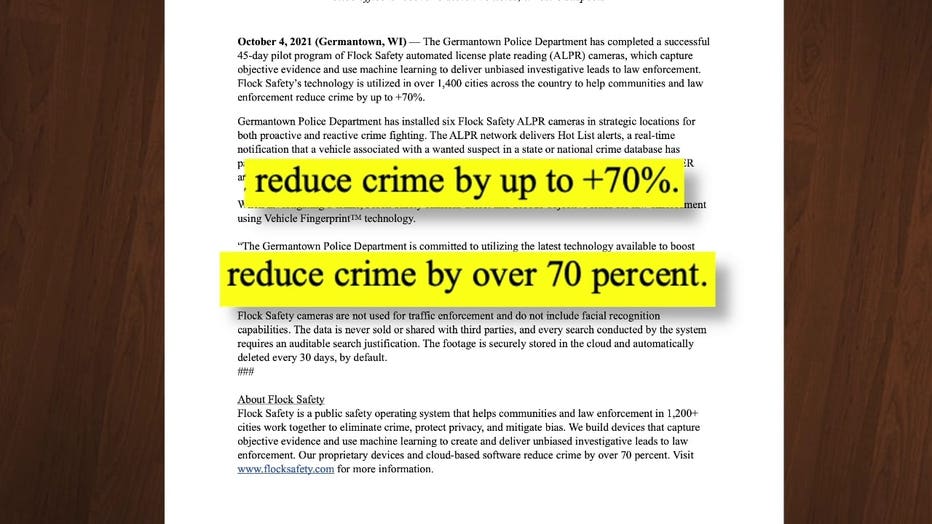
Germantown Police Chief Mike Snow says he did not verify claims by Flock that the cameras reduce crime by "over 70 percent." Still, the department issued a press release written on its behalf by Flock, which contained that claim.
Froedtert & the Medical College of Wisconsin told FOX6 they already use Flock cameras at select locations throughout their health network, and they are considering adding more. The next time you go in for a medical appointment, your car just might end up in a law enforcement database.
"My goal is to reach out and get our homeowners associations on board and have them fund the cameras," said Caponera, who sees the public-private partnerships as a win for both taxpayers and public safety. Stanley said it only expands an ever-growing, nationwide dragnet.
"That changes what it means to live a private life," he said. "Changes the relationship between the individual and their government."
Daily said constant surveillance is an inescapable part of modern life.
"Anywhere you go, you’re being watched, someway, somehow," he said.
And if technology can help take criminals off the street, expect the Flock to keep growing.
Featured
Wisconsin AI-powered Flock cameras are tracking where you drive
Hundreds of AI-powered cameras are tracking vehicles in Wisconsin. Police call it a "game changer." Privacy advocates call it "mass surveillance."
The 70% crime reduction claim in that Germantown press release appears to come from San Marino, California, where residential burglaries dropped at the start of the COVID-19 pandemic. FOX6's investigation found San Marino's burglaries shot back up by 61% the following year with Flock cameras still in place. The police chief in San Marino did not respond to multiple requests for more detailed data.
In Cobb County, Georgia, Flock claims their cameras reduce crime by 60%. However, Cobb County Police Chief Stuart VanHoozer told FOX6 that was only for car break-ins in a single test location in a high-crime area over a six-month trial period.
The broader crime rate in Cobb County is down 22% over three years, he said, but he can't isolate how much of that is due to Flock versus other factors.
Grafton, Waukesha and West Allis Police Departments all told FOX6 they do not have data showing a broad reduction in crime due to Flock. They said it's showing up in arrests.
Since the addition of Flock cameras in West Allis, they attribute 3.8% of all arrests to Flock alerts. Waukesha said, since its cameras were first installed in the summer of 2022, they've had 175 calls for service due to Flock. Those calls led to 10 arrests.


